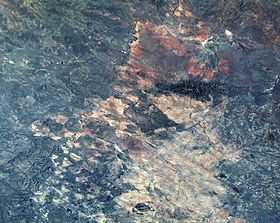Blouberg (range)
| Blouberg | |
|---|---|
|
NASA picture of the Blouberg (dark shape) and the Magkabeng Plateau right south of it | |
| Highest point | |
| Elevation | 2,040 m (6,690 ft) |
| Coordinates | 23°05′0″S 28°51′0″E / 23.08333°S 28.85000°ECoordinates: 23°05′0″S 28°51′0″E / 23.08333°S 28.85000°E |
| Dimensions | |
| Length | 36 km (22 mi) E/W |
| Width | 10 km (6.2 mi) N/S |
| Geography | |
|
<div style="padding:2px 2px 2px 2px;>  | |
| Country | South Africa |
| Province | Limpopo |
| Parent range | Soutpansberg |
| Geology | |
| Orogeny | Kaapvaal craton |
| Period | Neoarchean to early Paleoproterozoic |
| Type of rock | Bushveld igneous complex, sandstone |

The Blouberg, meaning "Blue Mountain" in Afrikaans, is a range of mountains in Limpopo Province, at the far north of South Africa. It is located in Blouberg Local Municipality, Capricorn District.[1]
The Blouberg has traditionally been an important place for the Tswana people in the area. This rocky mountain range rises over a plateau averaging 900 m to the west of the western end of the Soutpansberg range. The Blouberg is topped by massive rocky outcrops resembling castles or fortifications with sheer walls. Its highest point reaches 2,040 m and is also the highest point of the entire Soutpansberg/Blouberg system.[2] The Brak River (also known as Hout River), a tributary of the Sand River, flows diagonally along the southeastern edge of the Blouberg,[3] separating it from the Soutpansberg further east. Although both ranges are clearly delimited from the geographical point of view, geologically the Blouberg is homonymous with the Soutpansberg.[4]
The Blouberg is part of the 'Vhembe Biosphere Reserve', named a biosphere reserve by UNESCO since 2009.[5] The reserve includes also the neighboring Makgabeng Plateau, the Soutpansberg, the northern part of the Kruger National Park, the Makuleke Wetlands and the Mapungubwe Cultural Landscape.[6]
Ecology
The vegetation of the Blouberg ranges from sub-tropical veld or savanna at the base, to a kind of Afro-montane vegetation related to the Cape Fynbos near the summits. The rocky cliffs are a haven for birds of prey such as the Cape vultures.[7]
The Blouberg, like its larger neighbor further east, the Soutpansberg, is known for a high level of endemism of its invertebrate fauna, such as the Swanepoel's widow butterfly that is found on the southern slopes of the range.[8][9] The Waterberg flat lizard and a subspecies of the common flat lizard are found in this range.
Rock climbing
The Blouberg is one of the most spectacular rock climbing areas in South Africa. As a rock climbing destination it is famous for its sheer 350 m "Moonshadow" wall.
Most of the climbing spots are on private land but climbers can make arrangements through the Alldays Mountain Club in nearby Alldays, Limpopo.[10]
See also
References
- ↑ Seraki Blouberg Route - South Africa - Open Africa
- ↑ Soutpansberg - Introduction
- ↑ About Blouberg
- ↑ Ecoport Soutpansberg
- ↑ Vhembe Region named UNESCO’s Biosphere Reserve
- ↑ UNESCO - Biosphere Reserve Information
- ↑ Blouberg Nature Reserve, Limpopo
- ↑ Schönhofer, A.L. (2008). "On harvestmen from the Soutpansberg, South Africa, with description of a new species of Monomontia (Arachnida: Opiliones).". African Invertebrates 49 (2): 109–126. doi:10.5733/afin.049.0206.
- ↑ Haddad, C.R. (2009). "Vendaphaea, a new dark sac spider genus apparently endemic to the Soutpansberg Mountains, South Africa (Araneae: Corinnidae).". African Invertebrates 50 (2): 269–278. doi:10.5733/afin.050.0204.
- ↑ New Blouberg RD by Hector Pringle
